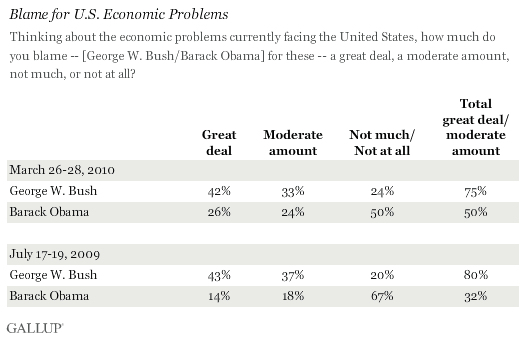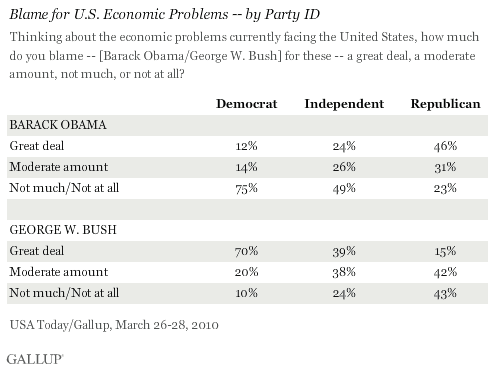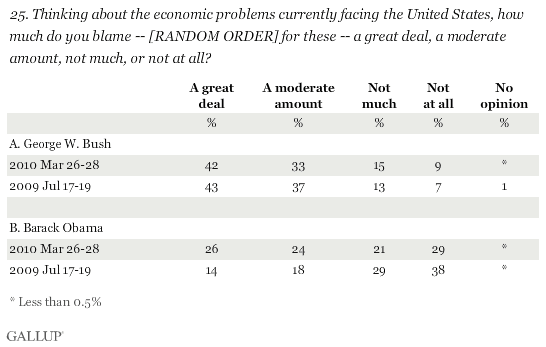PRINCETON, NJ -- More than a year into Barack Obama's presidency, Americans are more likely to say George W. Bush is responsible for today's economic problems than they are to say Obama is responsible. Gallup shows a significant uptick since last July in the percentage of Americans blaming Obama at least a moderate amount (from 32% to 50%), but little decrease (from 80% to 75%) in the percentage blaming Bush.

Proportionally, the gap in perceived culpability for current economic problems is even wider when one looks at the percentage blaming each president "a great deal" -- 26% for Obama and 42% for Bush.
"The 'blame' data suggest that these job ratings could be even lower were Obama more widely perceived as directly responsible for the economy's problems."
Obama has stated that he "inherited the most profound economic emergency since the Great Depression." And while some of his critics dispute the extent of the crisis, there is little debate that he arrived in Washington amid rising unemployment, struggling equity and housing markets, distressed banking and auto industries, and a rapid retreat in consumer spending. Americans in July 2009 clearly recognized that the nation's economic problems preceded Obama's term; at that time, close to half of Republicans (43%) -- in addition to most independents (63%) and nearly all Democrats (92%) -- believed Obama bore little or no responsibility for them.
Those figures have since declined, particularly among Republicans; nevertheless, political independents, as well as Democrats, continue to blame Bush much more than Obama for the current problems.

Obama's current job approval rating -- recently bobbing just below 50%, and low by historical standards -- may partly reflect Americans' general economic discontent. Indeed, against the backdrop of broadly low economic confidence, Obama's approval rating on the economy is now 37%, with 61% disapproving. The "blame" data suggest that these job ratings could be even lower were Obama more widely perceived as directly responsible for the economy's problems.
Gallup's Presidential Job Approval Center shows that, of the presidents in office during economic recessions, Gerald Ford, Jimmy Carter, and Ronald Reagan all received lower overall job approval ratings at the official "troughs" of their recessions than Obama has yet received as president. Ford's approval rating was 37% in March 1975; Carter's was 33% in July 1980; and Reagan's was 43% in November 1982.
However, other presidents who served during recessions -- Harry Truman, Dwight Eisenhower, John F. Kennedy, Richard Nixon, George H.W. Bush, and George W. Bush -- all had ratings of 50% or better at the troughs of those recessions. In most cases, this was a reflection of timing (shortly after inauguration) or of other major events (such as the Persian Gulf War and 9/11) overshadowing the economy.
Bottom Line
Theoretically, Obama accumulates more responsibility for the nation's economy every day he's in office. That could bear down increasingly hard on his approval rating if unemployment continues to hold at or near 10% and consumer attitudes remain negative. However, the big upside is that should the economy rebound on his watch -- and recent Gallup tracking has some signs of a "nascent" recovery -- Obama is poised to receive much of the credit.
Results are based on telephone interviews with 1,033 national adults, aged 18 and older, conducted March 26-28, 2010. For results based on the total sample of national adults, one can say with 95% confidence that the maximum margin of sampling error is ±4 percentage points.
Interviews are conducted with respondents on landline telephones (for respondents with a landline telephone) and cellular phones (for respondents who are cell phone only).
In addition to sampling error, question wording and practical difficulties in conducting surveys can introduce error or bias into the findings of public opinion polls.

